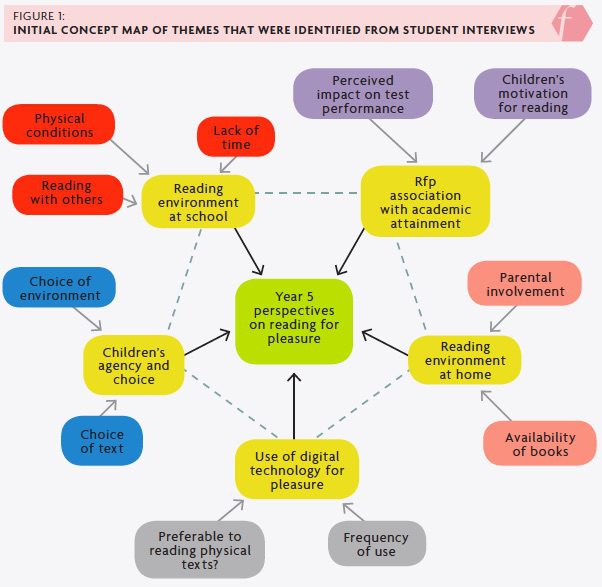Children’s perspectives on reading for pleasure: What can we learn from them and how can we adapt our practice accordingly?

Alice Reedy, Teacher, Kaizen Primary School (Part of East London Research School), UK
There is a broad range of existing research dedicated to the subject of reading for pleasure and the advocacy of engaging in this activity as a key factor in children’s educational development, both academic and social (Sainsbury and Schagen, 2004; Petscher, 2010; Sullivan and Brown, 2015; Whitten et al., 2016; Clark and Teravainen, 2017; DfEDepartment for Education - a ministerial department responsi... More, 2017). Policymakers and researchers seem to have reached a consensus that reading for pleasure has a significant positive impact on a child’s future life chances in terms of educational success; the OECD report ‘Reading for change’ (2002) goes as far as to suggest that said impact is more important in indicating the future academic success of a child than their socioeconomic background and can also have a positive impact on a child’s future social mobility.
As educators, we are therefore professionally and morally obligated by the strength and wealth of this research to consider how to develop our own practice to ensure that we are appropriately supporting and encouraging students’ enjoyment of reading and likelihood to engage in reading of their own volition. If developing students’ engagement in reading for pleasure could potentially help them to overcome their socioeconomic disadvantage, then this is an area that should be prioritised. The questions that arise, then, are how do we best support reading for pleasure and how do we overcome the existing barriers that may be discouraging children from participating in this activity? As a newly appointed English lead, I felt especially motivated to explore any potential strategies that might emerge as a result of investigating these questions.
I consequently carried out a small-scale case study using a mixed-method approach of questionnaires and focus group interviews with selected students in my educational setting – a two-form primary school in the London borough of Newham. The school’s most recent 2015 OfstedThe Office for Standards in Education, Children’s Services... More report noted that ‘most pupils are economically disadvantaged and are supported by Pupil Premium’ (Ofsted, 2015, p. 3). I then used thematic analysis to identify the most prominent themes and ideas from the students’ discussions with the researcher. The themes that were identified as part of this data analysis are shown in Figure 1. This methodological approach was effective in yielding rich qualitative data for analysis, but limited in the generalisability of the data to a wider population.
The transcripts of the two interviews and the resulting analysis demonstrated that the most prevalent theme was the students’ desire to have increased independent choice over their reading material, rather than having this prescribed or dictated to them by adults. The students indicated their desire to have an input in the range of reading material provided by the school, as well as being given sufficient opportunity and freedom to select from this material. They suggested that this was not something they felt was currently happening in the school. This data reflected much of the literature I had previously engaged with, such as Cremin et al. (2014), Drage (2017) and the Centre for Research in Psychology, Behaviour and Achievement (2016), all of whom suggest that a key barrier to reading for pleasure in school may be the lack of children’s autonomy and choice over their own reading material, or even the lack of options of reading material available overall. A significant practical outcome of this research, particularly Cremin’s, has been the development of the Research Rich Pedagogies website (researchrichpedagogies.org), which identifies the practical strands within an effective reading for pleasure pedagogy, one of which states that children should ‘control more of their own reading and exercise their rights as readers’ (The Open University, nd).
The interviews indicated that children felt that they were being given limited opportunities by their teachers to choose their own reading materials. It was therefore important to disseminate both this finding and the wider research around agency and reading in order to best support staff to develop a pedagogy that supports reading for pleasure. Therefore, the following strategies were implemented:
- Teachers were given full training, where they engaged with the research and were provided with guidance in ensuring that all students are given sufficient time, space and freedom to choose their own reading material, undirected or restricted by adult recommendations
- Students were given the opportunity to decide on new texts for their class reading corners and were also encouraged to design and redecorate the areas themselves
- In order to facilitate more opportunities for children to choose their own reading material, from a broader range of texts, a new and attractive container for a school library was obtained, the stock and design of which were largely informed by the students
- A school-wide survey was used to inform the stocking of the new school library, ensuring that a large selection of the books had been selected by the students themselves
- A school-wide competition was launched to design the library itself, and the winners took part in the decoration of the new building, providing another chance for children to take ownership of their reading environment
- Regular opportunities were introduced for all students and parents to access the new library and have sufficient time for independent browsing and borrowing.
The strategies outlined above were implemented in order to develop the culture of reading for pleasure in the school, and although this is a difficult outcome to measure in terms of quantitative data, the impact was notably positive. Library engagement and borrowing rates rose significantly. In the three months between January and March 2019, Junior Librarian software indicated a 32.7 per cent increase in borrowing rates as compared with the previous year. Additionally, staff and student feedback revealed that the new focus on students’ choice, autonomy and contribution was encouraging most students to develop or begin positive, independent relationships with reading. This ethos will therefore continue to underpin future strategies and developments in the school’s approach to reading for pleasure. For example, when additional funds become available for new book purchases, the school council are given responsibility for gaining feedback from their classes concerning what new texts should be purchased, and using this to inform book orders for the library. Pupil feedback is also gathered regularly, focused on how much children feel that they are given sufficient opportunities to read independently and with freedom of choice. As we move forwards, the school will be looking to the other recommendations of the Research Rich Pedagogies website, such as developing social reading environments, to further build on the school’s culture of reading for pleasure.
References
Centre for Research in Psychology, Behaviour and Achievement (2016) Reading for pleasure: Reviewing the evidence. Available at: www.booktrust.org.uk/globalassets/resources/research/reading-for-pleasure-in-secondary-schools-literature-review.pdf (accessed 13 March 2019).
Clark C and Teravainen A (2017) Celebrating Reading for Enjoyment: Findings from our Annual Literacy Survey 2016. London: National Literacy Trust.
Cremin T, Mottram M, Powell S et al., (2014) Building Communities of Engaged Readers: Reading for Pleasure. London and NY: Routledge.
Department for EducationThe ministerial department responsible for children’s serv... More (DfE) (2017) Progress in International Reading Literacy Study (PIRLS): National report for England. Available at: www.gov.uk/government/uploads/system/uploads/attachment_data/file/664562/PIRLS_2016_National_Report_for_England-_BRANDED.pdf (accessed 13 February 2019).
Drage E (2017) No place for pleasure? Research Rich Pedagogies. Available at: https://researchrichpedagogies.org/recommends/article/no-place-for-pleasure (accessed 12 February 2019).
Ofsted (2015) School report: Kaizen Primary School. Available at: https://files.ofsted.gov.uk/v1/file/2496350 (accessed 28 June 2020).
Organisation for Economic Co-operation and Development (OECD) (2002) Reading for change: Performance and engagement across countries. Available at: www.oecd.org/education/school/programmeforinternationalstudentassessmentpisa/33690904.pdf (accessed 25 April 2019).
Petscher Y (2010) A meta‐analysis of the relationship between student attitudes towards reading and achievement in reading. Journal of Research in Reading 33(4): 335–355.
Sainsbury M and Schagen I (2004) Attitudes to reading at ages nine and eleven. Journal of Research in Reading 27(4): 373–386.
Sullivan A and Brown W (2015) Reading for pleasure and progress in vocabulary and mathematics. British Educational Research Journal 41(6): 971–991.
The Open University (nd) Reading for pleasure pedagogy. Available at: https://researchrichpedagogies.org/research/theme/reading-for-pleasure-pedagogy (accessed 28 June 2020).
Whitten C, Labby S and Sullivan S (2016) The impact of pleasure reading on academic success. The Journal of Multidisciplinary Graduate Research 2(4): 48–64.












A thoroughly enjoyable and thought provoking read!